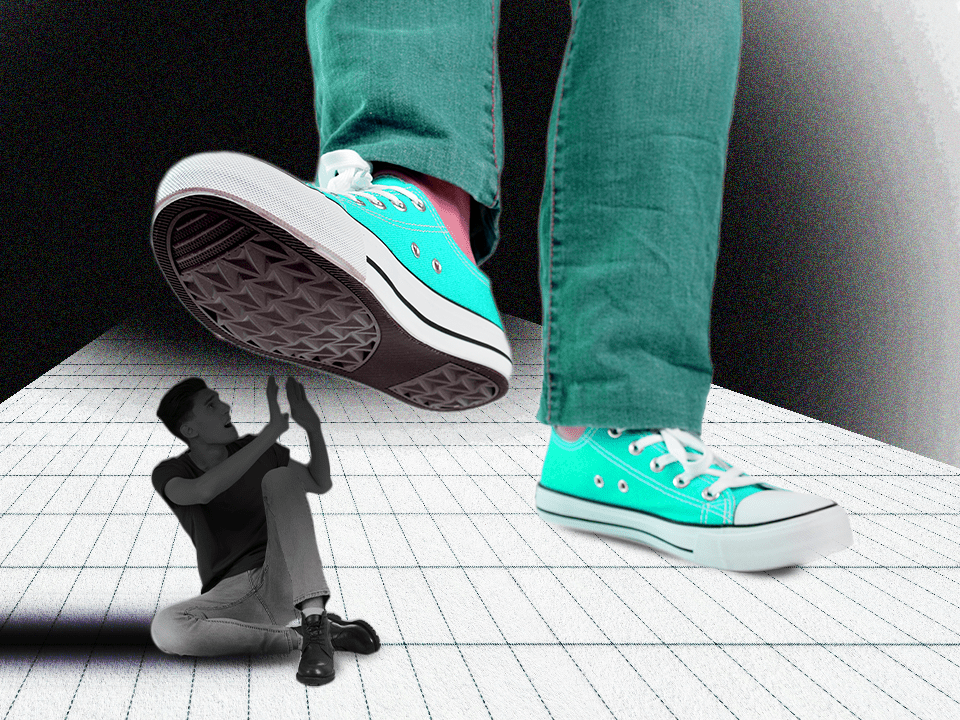What to Do When You Feel Like You’re Being Bullied
Sorry, do you know where I can find the high road?
Anyone who was ever a middle schooler is painfully aware of what bullying is. And as much as we’d all love to leave visions of 13-year-old tormentors in layered Abercrombie polos behind, the grown-up world has them too. The tricky thing is that now it’s morphed into workplace bullying from your boss or cyberbullying up in your DMs.
Adults get bullied all. the. time. Only, in the real world, we call it harassment and it’s a pretty big problem, says psychologist Kyler Shumway, PsyD, chief clinical officer of Deep Eddy Psychotherapy. Family members, romantic partners, and randos online can all make you feel small. No matter how old you are, if you feel like you’re being bullied, well, you probably are.
“The visible behaviors of bullying are likely to shift as we get older and tend to become a bit more covert (read: passive-aggressive) in nature,” explains clinical psychologist Jaime Zuckerman, PsyD, who specializes in relationship issues. “Think eye-rolling, mocking, deliberate attempts to exclude someone … speaking in a condescending or threatening manner, or violating boundaries—physical or otherwise,” she adds.
No matter how old you are or what form it takes, the effects of bullying can negatively impact your mental health, explains Dr. Zuckerman. “Bullying can cause significant anxiety, social isolation, shame, embarrassment, physical illness, and even depression,” she says.
That’s a lot; we get it. But you’re not doomed. Instead, you can take action to stop the harassment, protect your mental and emotional health, and restore your self-esteem with a little advice from the pros. Here’s exactly how to take care of yourself in the face of this douchebaggery.
Repeat after us: It’s not your fault.
In many cases, bullying happens when someone wants to capitalize on an imbalanced power dynamic, says Dr. Zuckerman. Maybe they’re your manager, your professor, your parents, or even a partner who makes more money than you. This is about them and has absolutely nothing to do with you.
What's more: Being bullied as a grownup can bring up a flood of insecurities, shame, and pain you experienced at other points in your life, says Dr. Zuckerman. “Your mind remembers threats to safety better than just about anything else, which is why your body snaps into panic mode when that narcissistic boss insults you in front of your coworkers,” she explains.
If you’re caught in a loop of, “What did I do to deserve this?” you can shift out of self-blame by visualizing yourself as a mirror reflecting back the wounds of whoever is bullying you. Say your manager lashes out. Instead of internalizing it, think about what circumstances would lead this person to take their emotions out on you. “Their mistreatment is not a reflection of your true worth,” says Dr. Shumway. Bullies often attack as a result of unmet needs and suffering, he explains. Basically, “hurt people hurt people.” No one is suggesting you dish out free passes here, but this reframe enables you to see that it’s them, not you.
Step up your self-care.
If you want to curl into a ball and cry to your mom (assuming she’s not the problem here), that’s understandable. And you should! But, when you’re ready, engaging in the things that make you feel good about and in control of your life can combat the narrative of powerlessness bullies want you to believe, says Dr. Zuckerman.
That could look like getting to the grocery store instead of relying on takeout, making time to move your body, getting some friend dates on the calendar, or finally writing in that journal you bought like four months ago. Anything that gives you a sense of authority over your life or brings you joy is fair game.
To be clear, wallowing in the comfort of Gilmore Girls is not off limits (see: things that bring joy), but if you can keep up with a weekly or daily routine that makes you feel like both hands are on the wheel of your life, you’ll fight the effects of being bullied more effectively.
Disengage.
If your nemesis hasn’t threatened or harmed you, the best thing you can do to disarm them is to cap your reaction to their harassment. “Oftentimes bullies want attention, control, and power,” says Dr. Zuckerman. “By ignoring their behaviors or giving them a neutral, matter-of-fact response, you deny them the opportunity to gain that control.” Basically, they’re playing a game, and if you refuse to play, it’s going to get boring real fast.
Yes, it can be extremely tempting to fight back or at least engage with the bully until you win. But the unsatisfying truth is that reacting feeds right into a bully’s game, which means they’ve already won.
Your move: Shrug off that obnoxious comment or insult with a casual “whatever” or nothing at all. If you can stand tall and make eye contact, even better, the experts say. Your lack of reaction may actually piss them off at first. If that happens, you can say something chill like, “Well, anyway…” and stroll away. Chances are, they’ll deflate in your wake.
You could also consider taking a break from the situations in which you find yourself bullied. If that’s social media, maybe delete the apps for a minute. If it’s family gatherings, rain check the next get-together. Taking a step back can de-escalate and free up more time to take care of yourself.
Whatever you do, don’t try to “this is fine” your way through it. If we accept or label this kind of behavior as “normal,” it will become normal, says Dr. Shumway. “We create a self-fulfilling prophecy,” he adds. Anything big or small that empowers you in this situation—be it setting boundaries or reporting the issue—can break the cycle, he explains.
Keep a paper trail
If you have physical proof of harassment or bullying, maybe keep it handy for now. Though it’s tempting to delete evidence of your mistreatment, having those receipts can empower you to report a bully, Drs. Shumway and Zuckerman agree.
That could be a cyberbully’s DMs or an out-of-line email from a boss, a professor, or anyone you engage with in a professional setting. Most workplaces and schools have clear policies meant to protect you, so you’ll benefit from documenting the harassment or bullying if you plan to bring it to a trusted superior or HR, the experts say. You might even CC a friend or colleague on emails so that someone else witnesses the shenanigans in real time.
Call in the experts.
If bullying tanks your sleep, messes with your focus, or makes you feel generally crummy about yourself, that’s your sign it’s time to find a mental health pro to help navigate. “Therapy gives you space to voice your concerns and develop coping skills and emotional regulation strategies,” says Dr. Zuckerman. All of which are especially helpful when you’re under attack.
Group therapy can also be a game-changer for people who are being bullied. It can be a positive emotional experience that allows you to shift out of survival mode and really drop the pain you’re carrying so you can heal it, adds Dr. Shumway.
So if you’ve been canceling plans to hunker down or turning to coping mechanisms that aren’t great for you, see if there’s a mental health pro who can start working with you ASAP. You got this!
Wondermind does not provide medical advice, diagnosis, or treatment. Any information published on this website or by this brand is not intended as a replacement for medical advice. Always consult a qualified health or mental health professional with any questions or concerns about your mental health.




